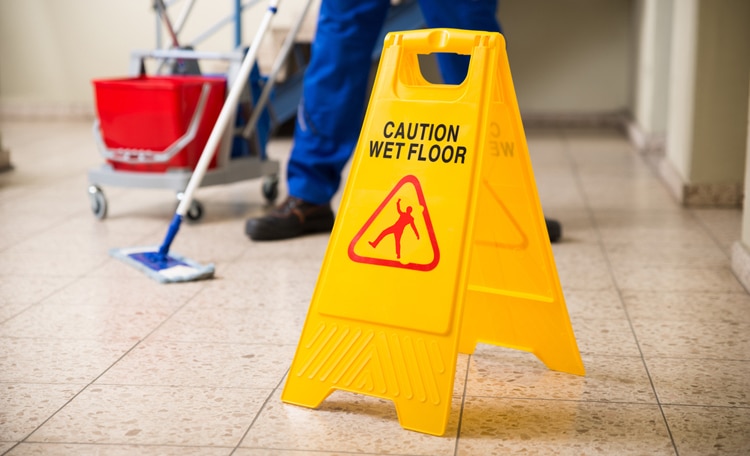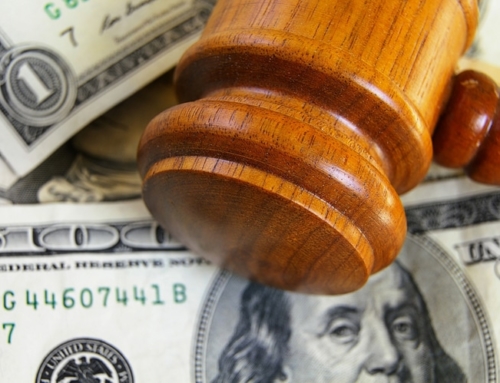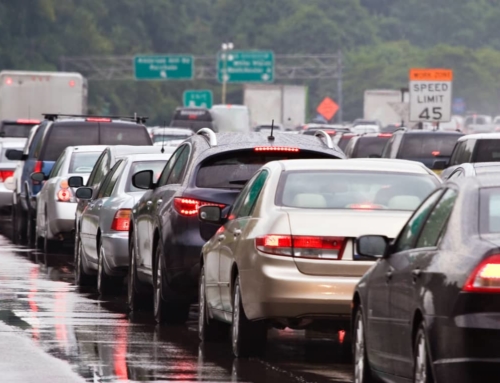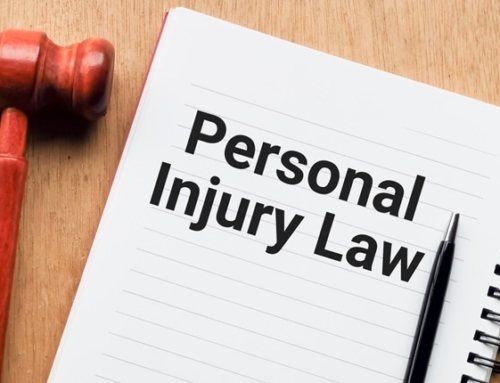The worksite should always be a secure venue, but not every company provides that kind of working environment consistently. You could slip and fall at work through no fault of your own.
You should not take slip and fall accidents lightly. People involved in them can wind up badly hurt. They may need to partner with an experienced Texas slip and fall lawyer to help them receive compensation to properly deal with their injuries.
Take appropriate action and consider contacting our Texas injury lawyers if you were involved in a slip and fall accident at work. Continue with this article to learn more about the severity of slip and fall accidents and what you should do after being involved in one.
The Prevalence and Severity of Slip and Fall Worksite Accidents
Slip and fall worksite accidents may look fairly innocuous, but once you dig into the numbers, you will quickly understand how dangerous they truly are.
According to the Texas Department of Insurance, 15% of work-related deaths in the state were due to slips, trips, and falls. It is a startling number and it highlights how dangerous a worksite can truly be if it is not properly maintained.
Around 8.9 million emergency room visits each year are also related to accidents of someone falling. You may wind up with an enormous medical bill because you slipped and fell at work.
In the wake of that accident, you need to figure out a way to secure compensation from your employer. That may be the only way to pay for your hospital stay without digging into your savings account.
What You Must Do Following Your Slip and Fall Accident at Work
Do not let your employer off the hook if you believe their negligence contributed to your fall at work. Holding them responsible is even more important if you sustained an injury from the fall. Now that you have medical bills to worry about, you must secure compensation from the party that caused the accident.
So, how do you go about getting that compensation from your employer? It is all about doing the right things in the aftermath of your accident.
We have put together a list of the things you need to do following your accident to increase your chances of taking home compensation.
Report the Accident
The most important thing you need to do following your accident is to report it. We cannot stress that enough. You need to report the slip and fall accident or else your case may not have a leg to stand on.
The point of reporting the accident is simple. You want concrete evidence that this incident occurred. The documentation detailing the incident is the exact type of evidence that you need.
Be as thorough as you can while reporting the accident. Recall and relay everything that happened before you fell. Creating a detailed account of the accident is helpful because that will make your documentation harder to dispute.
Secure a Copy of the Accident Report
The people you reported the accident to are employees of your company. Ultimately, their job is to serve the company. Your concerns may not necessarily be their priority.
This is our way of saying that you need to be diligent after filing your accident report. Do not take their word for it when they say they have created documentation of your accident. Go ahead and ask for a copy of the report as well.
Upon receiving the report, check it thoroughly to ensure that it accurately reflects what you said. Do not leave the premises until you have that accurate and detailed report in hand.
Collect Evidence
A report detailing your accident is certainly helpful. However, that alone is not enough to lock down a favorable outcome if your lawsuit makes it to court. In addition to that report, you must also collect evidence to bolster your case.
Start by going back to the spot where you slipped and fell. Take out your phone and start shooting a video of the area. Note every hazard so your video can clearly display what kind of environment you worked in.
Focus on things like lighting and the condition of the floor because they are factors known to contribute frequently to slip and fall mishaps. If the spot is devoid of protective barriers, highlight that in your video as well.
Hopefully, you are well enough to document the accident site yourself. If you are not, ask a fellow employee to do that for you. Waiting until the next day to shoot the video is not an option because the company may fix that place up before you can capture any footage.
Evidence can also come in the form of testimony provided by your fellow employees. Approach anyone who saw what happened and ask them if they can provide a statement. Secure as many statements as you can because having that many people vouch for your story will only legitimize it in the eyes of the court.
Be Careful while Interacting with Your Employer
This next tip is about something you avoid doing after your accident.
At some point after the incident, you can expect your employer to get in touch. Your boss may call you into their office to discuss the incident. They may then ask you to detail what happened.
Avoid doing that.
Nothing good can come out of you talking about the accident with your employer at this point. Their focus will be on getting you to say something they can interpret as an admission of guilt regarding the accident. They may try to get you to say that the accident was mostly your fault.
The state of Texas bars plaintiffs from recovering damages if they are more than 50% to blame for the accident. That means you could miss compensation entirely because of some comment you made while speaking to your boss.
Even if you manage not to tank your case that badly, you can still do a lot of harm by talking to your employer.
If you start to apologize or mention things that you could have done to prevent the accident, your employer could point to them as indicators that you should at least receive partial blame. That can still be a win for them because the courts can reduce your compensation package based on how much responsibility you bear.
Keep in mind that your employer does not need to speak to you if they want to learn more about the incident. They can read the accident report if they need more details.
Do Not Accept Any Settlement Offer
Once you shut down your employer’s efforts to talk to you, their next course of action may be getting you to settle. They may agree to pay you a fixed sum of money in exchange for you waiving your right to sue.
At first, that may sound like a good deal. It may be especially enticing if your medical bills are piling up because you sustained some injuries.
We understand how tempting it is to accept that offer, but you probably already know that doing so would not be in your best interests.
For starters, it is called a settlement for a reason. The money they are offering as part of the settlement is likely well below the amount you could get if you sued them. They are essentially asking you to forgo your ability to pursue greater compensation in exchange for guaranteed money.
Is that a worthy trade-off for you? In all honesty, it probably will not be.
Even if you are interested in settling eventually, you should avoid doing that early. Allow the case to play out until you get a better sense of how much you can win if your lawsuit succeeds. That will be the time when your employer will put forth their best settlement offer, and you can re-evaluate it then.
Head to the Doctor
We have already discussed how dangerous slip and fall accidents are. With that in mind, you should head to the doctor as soon as possible.
Get a full examination so the doctor can check for potential fractures. If you hit your head on the way down, you may also need to undergo a brain exam.
Going to the doctor accomplishes three things.
Of utmost importance here is finding out if you are healthy. You need to confirm that right away because you do not want to delay care for any serious injuries.
Paying a visit to the doctor is also recommended because you are collecting more evidence. Your doctor’s diagnosis can back up the claims you made in the accident report. Your employer will have a hard time discrediting the diagnosis your doctor provided.
Also, you can find out how much compensation you will need, thanks in part to your doctor. Use the medical reports they provide to put forth a more accurate number when you make your compensation claim.
Partner with a Personal Injury Attorney
Last up, you will need to hire a personal injury attorney before you proceed with your lawsuit against your employer.
Throughout this article, we have detailed the different ways that your employer can attempt to pull one over on you. If you have never been in that kind of predicament before, it is easy to fall into one of their traps.
You need to hire a lawyer to give yourself a fighting chance.
Once you have enlisted the services of a lawyer, you can ask them to handle different tasks for you. For instance, they can handle all the conversations that your employer attempts to initiate. If you want nothing to do with your employer while you are recovering, your lawyer will ensure that they stay out of your hair.
Your attorney can also review any documents that your employer sends your way. Count on your lawyer to flag any documents that appear suspect.
Should you decide that you want to settle, your lawyer can help with that too. They can negotiate a better deal on your behalf. They can also evaluate the offers sent by the other party and tell you if they are playing fair.
Simply put, you will need a lawyer on your side if you want a favorable outcome for your slip and fall accident case.
How Much Can You Expect to Receive as Compensation for Your Slip and Fall Case?
Let’s say that you decided to take your employer to court because they failed to give you a safe working environment. How much can you expect to receive if you push forward with that plan? The answer to that question will depend on a few important factors.
Actual Damages
Actual damages account for the tangible losses you sustained because of your slip and fall accident. These include your medical expenses and damage to the pieces of your property you had on your person when you fell.
In addition to those items, the actual damages should also compensate you for your lost wages. Moving forward, the actual damages must also cover your rehabilitation if deemed necessary. It should pay any home upgrades necessitated by your injuries for the actual damages.
General Damages
Your compensation package should also include general damages. The general damages should cover your non-monetary losses.
Examples of non-monetary losses you may sustain include pain and suffering, loss of opportunity, and disfigurement.
The courts calculate general damages using different methods and will determine the specific method used in your case.
Do not worry about calculating the general damages yourself. Your lawyer can do that for you.
Your Share of the Blame
As we noted earlier, your share of the blame for the accident can also affect the amount of compensation you will receive. Work with a lawyer to ensure the courts do not decrease your compensation by false claims.
Successfully winning a slip and fall accident case is possible as long as you partner with the right lawyer. Contact us at Barrus Injury Lawyers, and we will make sure that you receive nothing but the best in terms of legal assistance.





